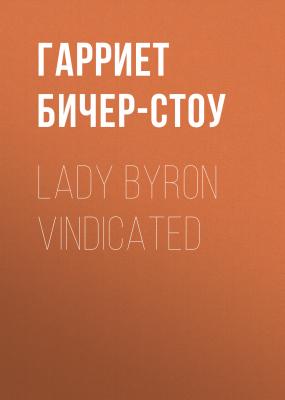Lady Byron Vindicated. Гарриет Бичер-Стоу
Читать онлайн.| Название | Lady Byron Vindicated |
|---|---|
| Автор произведения | Гарриет Бичер-Стоу |
| Жанр | Биографии и Мемуары |
| Серия | |
| Издательство | Биографии и Мемуары |
| Год выпуска | 0 |
| isbn |
. . . .
‘I proceed to deal more generally with Mr. Moore’s book. You speak, Mr. Moore, against Lord Byron’s censurers in a tone of indignation which is perfectly lawful towards calumnious traducers, but which will not terrify me, or any other man of courage who is no calumniator, from uttering his mind freely with regard to this part of your hero’s conduct. I question your philosophy in assuming that all that is noble in Byron’s poetry was inconsistent with the possibility of his being devoted to a pure and good woman; and I repudiate your morality for canting too complacently about “the lava of his imagination,” and the unsettled fever of his passions, being any excuses for his planting the tic douloureux of domestic suffering in a meek woman’s bosom.
‘These are hard words, Mr. Moore; but you have brought them on yourself by your voluntary ignorance of facts known to me; for you might and ought to have known both sides of the question; and, if the subject was too delicate for you to consult Lady Byron’s confidential friends, you ought to have had nothing to do with the subject. But you cannot have submitted your book even to Lord Byron’s sister, otherwise she would have set you right about the imaginary spy, Mrs. Clermont.’
Campbell now goes on to print, at his own peril, he says, and without time to ask leave, the following note from Lady Byron in reply to an application he made to her, when he was about to review Moore’s book, for an ‘estimate as to the correctness of Moore’s statements.’
The following is Lady Byron’s reply:—
‘DEAR MR. CAMPBELL,—In taking up my pen to point out for your private information22 those passages in Mr. Moore’s representation of my part of the story which were open to contradiction, I find them of still greater extent than I had supposed; and to deny an assertion here and there would virtually admit the truth of the rest. If, on the contrary, I were to enter into a full exposure of the falsehood of the views taken by Mr. Moore, I must detail various matters, which, consistently with my principles and feelings, I cannot under the existing circumstances disclose. I may, perhaps, convince you better of the difficulty of the case by an example: It is not true that pecuniary embarrassments were the cause of the disturbed state of Lord Byron’s mind, or formed the chief reason for the arrangements made by him at that time. But is it reasonable for me to expect that you or any one else should believe this, unless I show you what were the causes in question? and this I cannot do.
Конец ознакомительного фрагмента.
Текст предоставлен ООО «ЛитРес».
Прочитайте эту книгу целиком, купив полную легальную версию на ЛитРес.
Безопасно оплатить книгу можно банковской картой Visa, MasterCard, Maestro, со счета мобильного телефона, с платежного терминала, в салоне МТС или Связной, через PayPal, WebMoney, Яндекс.Деньги, QIWI Кошелек, бонусными картами или другим удобным Вам способом.
